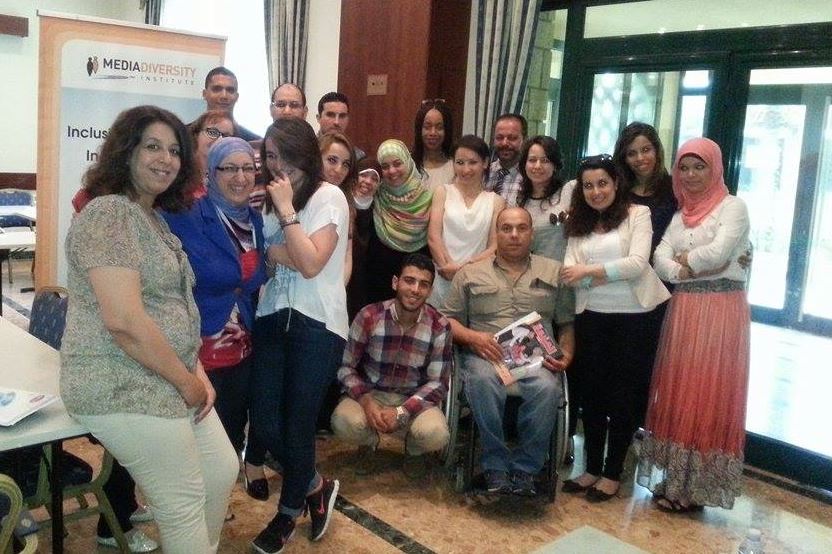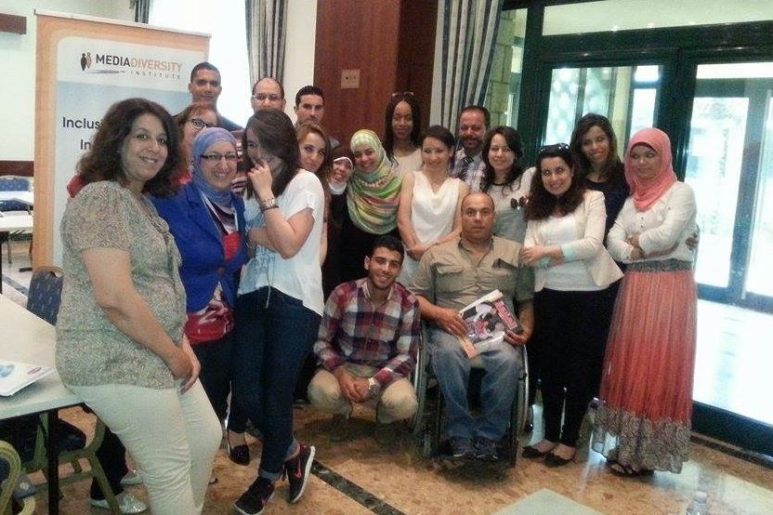Published: 15 July 2014
Country: Algeria
 A good media advocacy campaign goes beyond outreach work and hosting events. It is about raising awareness and being passionate about an issue you really want to see changed.
A good media advocacy campaign goes beyond outreach work and hosting events. It is about raising awareness and being passionate about an issue you really want to see changed.

This became clear on the first day of the Media Diversity Institute (MDI) workshop held for 17 participants from different NGOs across Algeria. Tackling diverse issues from HIV/AIDS and disability to human rights and drug misuse, the participants are all active in their fields but had not run a ‘traditional’ or online campaign. Therefore, the MDI workshop held 23-27 June 2014 was a good opportunity for CSOs members to practise their media and advocacy skills and to prepare for future campaigns.Psychologist Yamina Bentaher, president of Infocom Jeunes Tindouf, based in Southern Algeria, founded a branch of the national organisation focusing on youth-related issues, such as education, communication and mental health.
“There are many needs in Tindouf,” said Bentaher. “It’s far away from the capital which is a challenge.” Bentaher runs a project funded by UNHCR and provides psycho-social support and development training for young people, including social activities such as sewing workshops and cultural events, which are hosted in cultural centres and libraries. Around 300 refugees are receiving its services, supported by three staff members and seven volunteers.
 “The refugee situation here is 40 years old and is very bad,” said Bentaher. “Refugees don’t have what they need in terms of food, health care and education. They have been waiting a long time and live in five overcrowded camps. They need a solution.”
“The refugee situation here is 40 years old and is very bad,” said Bentaher. “Refugees don’t have what they need in terms of food, health care and education. They have been waiting a long time and live in five overcrowded camps. They need a solution.”
A significant part of the NGO’s work is intergenerational to break down barriers between adults and children. One example is Tell me Grandfather, an initiative to preserve intergenerational patrimony in families.
Kidney specialist Dr Mohamed Guemmama also wants to break down barriers. He established Green Tea in 2010 to reduce the stigma around, and raise awareness of HIV and AIDS in Tamanrasset, a southern city which borders with Mali and Niger.
Green Tea’s staff of four and their twenty volunteers are aware of 432 people living with HIV, but Guemmama puts the real figure closer to 1,000. Women are the most vulnerable and make up the majority of the cases as the main transmission is via sexual intercourse. The risks are increased due to the pervasive cultural stigma around HIV and AIDS.
“Stigma over HIV and AIDS is huge problem in our region, which means people don’t come forward to be tested,” Guemmama explains. This is despite the fact there is a central referral centre for HIV which respects confidentiality. “The problem is complicated because of the immigrants we have who are now second generation. They have lived here 20 years and need support,” he added.
The immigrants, largely from African countries, have helped to create a culture representing 43 different nationalities in the region. To tackle the cultural and health issues, Green Tea works closely with HIV specialists and has one on the team. The NGO also runs a harm reduction project to highlight the risks of drug taking as a factor in contracting HIV, such as sharing needles.
“Drugs are a big issue because of the location of our region – near Niger and Mali – where there is a lot of drug trafficking, making us a zone of transit,” says Guemmama.
One of his biggest goals is to reduce the stigma felt by those living with HIV and to get them to share their experiences with each other. “They say they feel they are not like other human beings because they can’t go to work and say they have HIV, or go to the doctor and say they have HIV. They feel they can’t go anywhere because of their HIV,” he adds.
As a result of MDI’s five day programme, both organisations are preparing to run awareness raising campaigns. Bentaher and her colleague Amina Lahmer came up with Talk to Me, a campaign to improve the communication between children and adults within a society, which she believes, limits children’s ability to express themselves. The aim of the campaign is to help increase children’s confidence and self-esteem.
“After the programme I feel I will be able to communicate with diverse audiences better and reach them. I also feel more willing to use social media to reach young people. To make a change we have to help each other and work together, which is what I learnt from the programme,” said Bentaher.
Bentaher will use the campaign to work with teachers, parents and children, with the help of psychologists. Focus groups will be hosted to discuss the problems they face, and to make parents and teachers aware of how their often aggressive behaviour impacts children. Children will also be encouraged to express themselves through child-friendly activities, such as play therapy and art therapy.
“Children are not a priority in our society,” argues Bentaher. “Adults don’t know how to listen to children so the children grow up with low self-esteem. They don’t know how to stand up for themselves,” she claims.
She plans to meet with members of the national organisation to update them on the training and to find someone to be in charge of the new blog, improving the existing Facebook page and developing campaign hashtags for Twitter. “That is the first step,” she says.
As for Guemmama: “We learned how to do a campaign, but more importantly how to do a good campaign. We have already started to motivate people on our social networks and we are ready to raise awareness of HIV and break down barriers based on what we have learnt from the MDI programme.”
This was the general sentiment of most participants, including Mohamed Rafik Hamiti from Union des Handicapés de la Wilaya de Sétif, who intends to launch a media campaign to highlight the achievements of people with disabilities in business and sport. He wants to see more positive coverage of disability in the media. “We want to bring the accomplishments of disabled people to the media’s attention and to inspire both disabled and non-disabled people. This course has helped me to feel more confident about doing that.”
Another workshop to help Algerian NGOs improve their media relations and advocacy skills was held in Algiers between 25-29 May 2014, and was attended by 14 NGO representatives from various organisations, such as the Network for the Defence of Children’s Rights, The Algerian League for the Defence of Human Rights, Voice of the Child, Algerian Youth Network, Association of People with Disabilities, and Women in Communications. Further workshops will take place later in the year.
The workshops are being organised as part of the project “Inclusive Media for an Inclusive Society: Building the presence of youth and marginalised voices in Algeria”, supported by the UK Foreign and Commonwealth Office.
